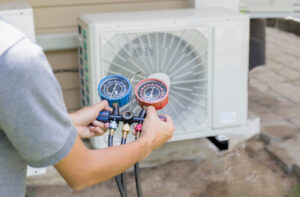What Are Things You Can Do To Lower Your Gas Bill?
In the United States, prices are increasing on a lot of things, from food to merchandise to gas! Some of these things you cannot control, but I began thinking there might be something I could do to help lower some of my bills. So I started searching if there is any way I could lower my gas bill. In my research, I found some of the quickest and most cost-effective things you can try and see results quickly. So what are things you can do to lower your gas bill?
Here is a list of some things you can do to lower your gas bill:
- Complete an energy audit.
- Check for air leaks.
- Invest in a smart thermostat to practice regulating your temperature.
- Try using a portable electric heater.
- Try reusing heat generated.
- Get regular maintenance on your HVAC system.
- Use thermal curtains or window panels.
- Turn down your hot water tank to 120 degrees.
So, these are some of the best solutions I could find to help lower your gas bill, but don’t stop here! Keep reading on, as in this blog post, I will go over each solution in more detail and you will begin to see your gas bill going down before your eyes as you implement these things!

1. Complete an Energy Audit
An energy audit is an evaluation of your home to inspect areas where air leaks might be occurring. This can be done by a professional, or you can do it yourself. In an energy audit, you must make sure you check your windows, external doors, air vents, electrical outlets, pipes, and plumbing. When doing this yourself, you may be able to solve some surface-level issues, but it is best to hire a professional if your budget permits. During an energy audit, beyond looking for air leaks, you must consider your ventilation, insulation levels, lighting, your appliances, and electronics.
2. Block or Seal Any Air Leaks
After completing your energy audit, make sure you check around the areas you checked in the audit to see if you feel air coming in. There is spray foam or caulk you can purchase to seal air you might find around piping or electrical outlets. You can also seal air coming in by installing insulation or pressure-sensitive weather strips around windows or doors. These weather strips are plastic or rubber. Energy.gov says that having air leaks could make up about 10 to 25 percent of your heating bill. This is a lot of savings you could be missing.
3. Regulate Your Thermostat or Purchase a Smart Thermostat
Your thermostat usage will affect what you pay for your gas bill. You can save as much as 3% for each degree you decrease your temperature. Another thing that can be done to help your gas bill is to purchase a smart thermostat. This can assist you with monitoring your temperature and saving money.
If you own a smart thermostat, you can control your temperature and set it based on the temperature outside, whether at home or when you go to bed. You can also optimize your temperature based on the rooms in which your home is used. These devices can offer multi-zone functionality enabling you to be strategic in your temperature use in various areas in your home. Smart thermostats use WiFi and allow you to control the temperature via your phone, tablet, or laptop. Sophisticated models can intuitively create a customized heating and cooling schedule based on your usage.

4. Utilize a Portable Electric Heater
This might be a good solution if you do not need to heat your whole home at one time. Perhaps you live alone. Having a portable electric heater might be the answer for you to decrease your costs. Instead of heating your whole house, you can use an electric heater to heat your area. However, you must be very careful using a portable electric heater. These heaters are considered to be fire hazards. Therefore, you need to make sure you monitor the heater and do not leave it unattended.
5. Reuse the Heat Already Generated
This little-known key can be a game-changer for lowering your gas bill. Perhaps you have never heard of this solution. You can reuse already-generated heat from things like having a hot shower or using your oven for cooking. This can help increase the temperature in your home. Make sure you keep the airflow open whenever you engage in these activities. For example, keep your oven door open when completed cooking, letting the warm air circulate. Keep the bathroom door open after a hot shower to allow the heat to go to other areas of your home.
6. Use Thermal Curtains or Insulated Window Panels
Using thermal curtains or insulated window panels can help lower your gas bill. Thermal curtains are designed with foam panels that capture heat within your room. These curtains also help with sound insulation. Another option is insulated panels for your windows. These panels attach to your windows utilizing strips of magnetic tape. This helps stop air from escaping and air from coming into your home. This acts as another type of insulation.
7. Turn Your Hot Water Tank to 120 Degrees
This is another key to keeping your gas costs low. Turning your hot water tank down can save from 3% to 5% on your water heating costs. Research shows that you’ll experience savings with every 10-degree temperature reduction. Other things you can do to assist with insulating your water heater are insulating your pipes. You can also install a water heater insulation blanket on your tank. These seemingly small changes can significantly impact lowering your gas bill.
8. Check Your HVAC Unit Regularly
Part of lowering your gas bill is maintaining your HVAC system. You must get regular maintenance on your HVAC system. Regular maintenance of your HVAC system includes keeping your heating and cooling system clean. This entails cleaning and replacing the air filter on your unit regularly. When your unit is not properly maintained, it can use more energy, and not the heating or cool air will not function at its peak performance.

Related Questions
How much does an average gas bill cost?
Research shows that the average cost of residential gas annually is $620, which equates to about $56 per month. Most people have their gas bundled with other electricity or hot water services. Your gas price depends on two things. It depends on where you live and how much gas you use. Your gas price varies based on a few factors. Your gas cost comprises taxes, infrastructure costs, supply, and demand. As well as if you are using propane gas or natural gas, as natural gas rates are lower than propane.
Will switching gas providers really help me save money?
You may not have the option of switching gas providers based on your area. However, you can check with the city government in your area to find out if you have any options. In the meantime, check with your current provider, ensure you are on the most cost-efficient plan, and follow some of the solutions mentioned in this article.
Conclusion
In this article, I discussed some of the easiest and most cost-benefiting measures to save you money to lower your gas bill. All of these solutions might not work in your home. However, try as many as possible and see if any of these ideas work for you. One of the easiest and best measures is to get regular maintenance on your HVAC system. This will save you money in the long term by preserving the life of your HVAC unit. Inflation is definitely on the rise. The cost of most things is increasing, so any measure you can employ to save additional money is well worth a try. Engage your family in your cost-cutting measures if possible. These are keys that they can utilize to get the absolute best savings on their gas bills.
